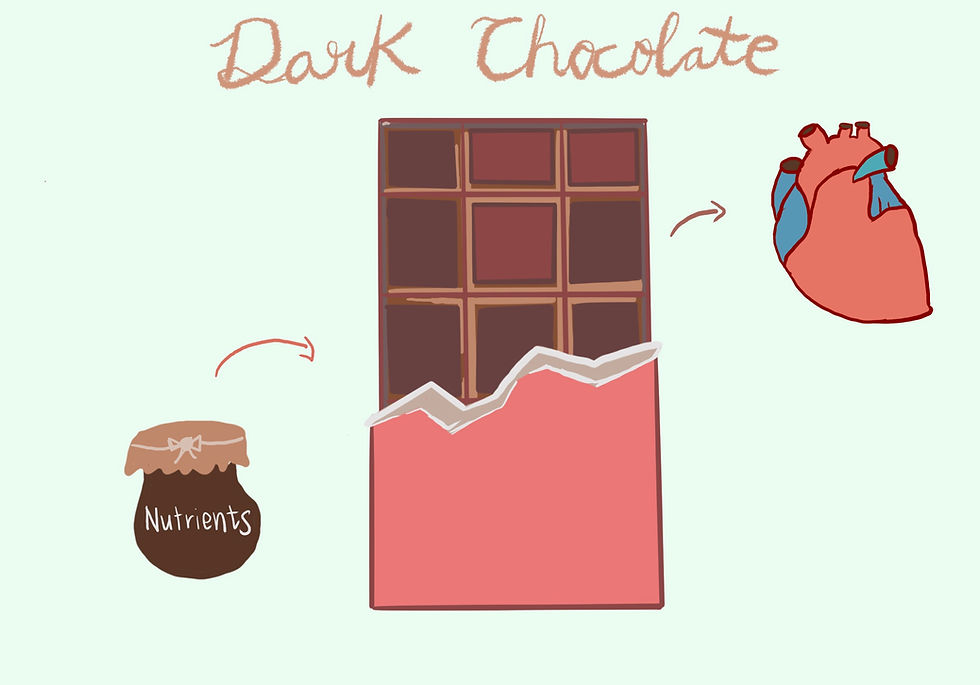Author: Qinghao Ma
Editors: Misha Wichita and Ken Saito
Artist: Susan Wu
From hot fudge sundaes to s’mores, it is true that one ingredient makes these delicious treats so much better: chocolate. Dating back to around 1900 BC, chocolate has been one of the most popular desserts for centuries. It is an irresistible treat that anyone would love. However, does the popular sweet treat benefit the human body?

There are many different types of chocolates worldwide: milk chocolate, white chocolate, dark chocolate, etc. These chocolates are all derived from the cocoa plant, with other ingredients added, such as sugar and milk powder (for milk chocolate). Looking at all of the options, dark chocolate is by far the healthiest variation of them all, according to the Hospital of Central Connecticut. To support this, a study was conducted by PubMed scientists in 2020 to explore whether or not chocolate would help episodic verbal memory and mood after 2 hours of consumption. In this study, 98 young adults who were deemed healthy, aged 18 to 24, were given either a 35g piece of dark chocolate or a calorie-matched 35g piece of white chocolate. After the 2 hours, participants were assessed on their episodic verbal memory and mood. Although there were no significant mood changes, participants who consumed dark chocolate experienced better verbal memory performance than those who consumed white chocolate for several outcome measures. Dark chocolate has numerous boosts for the human body and mind. Some of the main benefits of dark chocolate are its high nutritional value, ability to reduce the chance of cardiac disease, improving brain function, and boosting one’s general mood.
First and foremost, contrary to popular beliefs about how chocolate is very unhealthy, it contains a lot of nutrients that are essential for human functioning. For example, just 100g of dark chocolate with 70-85% cocoa contains approximately 11g of fiber, 66% of the daily values (DV) for iron, 57% of the DV for magnesium, 196% of the DV for copper, 85% of the DV for manganese, and many important minerals: potassium, phosphorus, zinc, and selenium. Despite the many essential nutrients and minerals, 100g of dark chocolate also comes with 600 calories and a moderate amount of sugar. Therefore, dark chocolate should still be consumed in reasonable amounts.
Furthermore, dark chocolate appears to have several benefits in regards to a person’s cardiovascular health too. As stated by the Mayo Clinic Health System, research shows that consuming dark chocolate could potentially lead to a lower risk of heart disease, diabetes, blood clots, cholesterol, and even some types of cancer. Moreover, based on the Harvard T.H. Chan School of Public Health’s research, dark chocolate contains approximately 50% to 90% cocoa solids, which are rich in plant chemicals known as flavanols or flavonoids. The flavanols allow the production of nitric oxide, a compound that relaxes blood vessels, improves blood flow, and decreases blood pressure. According to a review of studies, consuming dark chocolate 3 times per week decreased the risk of cardiovascular disease by an astonishing 9%. However, consuming dark chocolate more than 3 times per week does not cause a higher percentage of decreased risk of cardiovascular disease.

In addition to physiological effects, it has been noted that dark chocolate boosts brain function and brain power while preventing neurological brain disorders as well. As stated in some studies, the rich flavanols in cocoa vastly improve blood flow within specific areas of the brain. This solidifies the healthy components eating dark chocolate brings by often improving attention, verbal learning, and memory. Additionally, these flavonoids are theorized to reduce the chance of mild cognitive impairment, lowering major signs of progress for dementia, with the elderly. Although, more research is needed to be conducted to fully confirm this theory. In continuation, research done by PubMed Scientists, involving 25 healthy individuals, tested the difference between consuming dark chocolate vs. not consuming dark chocolate. 5 of the 25 individuals were placed in a control group, and were only allowed to consume low-calorie milk. For the rest of the 20 individuals, they were given 103.72mg of dark chocolate, per kilogram of body weight, that were rich in flavonoids and low in calories. This study went on for 8 days. The results were simplified; concluding that the subjects who did not consume dark chocolate had no significant changes in brain function, while subjects who consumed dark chocolate had an increase in brain function.
Finally, studies have confirmed that consuming dark chocolate brightens up one’s mood and helps control food cravings as well. Dark chocolate is known to boost the production of endorphins, a “feel-good” chemical that connects with opiate receptors within the brain and tends to cause a euphoric sensation within the body. Apart from this, studies have also shown that dark chocolate reduces pain and diminishes the negative effects in regards to stress. Chocolate is the most widely craved food, according to the University of Bristol. However, indulging oneself in excessive amounts of milk chocolate not only increases sweet cravings but is quite unhealthy too, due to its heavy sugar intake. On the other hand, consuming high-quality dark chocolate will both satiate cravings and provide healthy, necessary minerals as well as nutrients compared to milk chocolate.
Dark chocolate is certainly the healthiest type in the chocolate world! Does that mean one should consume it in tremendous serving sizes? Obviously not, but it is a good idea to start incorporating dark chocolate into one’s weekly diet. This treat not only boosts the brain but also helps the human body as a whole, with very minute negative impacts. As long as rational portion sizes are used, dark chocolate is a nutritious, refreshing item to add to a healthy shopping list.
Citations:
Alban, Patrick. “9 Proven Brain Benefits of Dark Chocolate.” Be Brain Fit, 8 December 2021,
https://bebrainfit.com/benefits-dark-chocolate/. Accessed 24 August 2023.
Balfour, Julia. “Nutrition Smack Down: Which Chocolate Is the Healthiest?” The Hospital of
Central Connecticut, 14 February 2023, https://thocc.org/about/news-press/news-detail?
articleId=47755&publicid=395. Accessed 24 August 2023.
“Chocolate Is The Most Widely Craved Food, But Is It Really Addictive?” ScienceDaily, 12
September 2007, https://www.sciencedaily.com/releases/2007/09/070911073921.htm.
Accessed 24 August 2023.
“Choose dark chocolate for your heart.” Mayo Clinic Health System, 4 February 2022,
https://www.mayoclinichealthsystem.org/hometown-health/speaking-of-health/choose-
dark-chocolate-for-your-heart. Accessed 24 August 2023.
“History of chocolate.” Wikipedia, https://en.wikipedia.org/wiki/History_of_chocolate.
Accessed 24 August 2023.
Jones, Jerlyn, and Natalie Butler. “7 Proven Health Benefits of Dark Chocolate.” Healthline,
13 July 2022, https://www.healthline.com/nutrition/7-health-benefits-dark-
chocolate#TOC_TITLE_HDR_2. Accessed 24 August 2023.
Lamport, Daniel J., et al. “Beneficial Effects of Dark Chocolate for Episodic Memory in
Healthy Young Adults: A Parallel-Groups Acute Intervention with a White Chocolate
Control.” NCBI, 14 February 2020,
https://www.ncbi.nlm.nih.gov/pmc/articles/PMC7071338/. Accessed 24 August 2023.
Santiago-Rodriguez, Efrain, et al. “Effects of Dark Chocolate Intake on Brain Electrical
Oscillations in Healthy People.” NCBI, 8 November 2018,
https://www.ncbi.nlm.nih.gov/pmc/articles/PMC6262453/. Accessed 24 August 2023.
Comments